Raj Kapoor and the Golden Age of Indian Cinema
May 12–June 28
Actor, director and mogul Raj Kapoor (1924-1988) was one of the giants of Indian cinema, and is synonymous with the rise of the monolith known as "Bollywood." Largely unknown in North America — except to millions of fans of South Asian descent — Kapoor is revered not only in India but throughout the former Soviet world, the Middle East and beyond for the films he made during the Golden Age of Indian cinema.
Kapoor began his career as an actor with his father Prithviraj's famed theatre company and then in small film roles beginning at age 11. Kapoor founded RK Films in 1948 and made his debut as producer, director and star with the hit film AAG, in which he starred for the first time with his onscreen muse Nargis. Deriving his screen persona from the smirk and swagger of Clark Gable, the heightened emotions and showmanship of Gene Kelly and most importantly Charlie Chaplin's underdog heroism and sense of pathos, Kapoor rapidly became the biggest superstar in Indian cinema. Meanwhile, his stylistic innovations as a director — from the gritty neorealism of his early films, to his introduction of epic-length musical numbers, to the eye-popping Technicolor delirium of his more commercial-minded late period — helped set the template for Bollywood films today.
Raj Kapoor and the Golden Age of Indian Cinema was curated by Noah Cowan, artistic director, TIFF Bell Lightbox, and organized by TIFF, IIFA and RK Films with the support of the government of Ontario.
This series is co-presented with the Freer Gallery of Art. Films at AFI Silver listed below. For information on screenings taking place at the Freer, visit asia.si.edu.
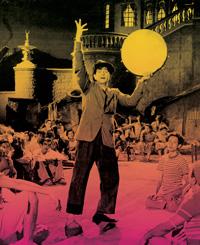
"Raj Kapoor's singular and gargantuan talent subsumes a variety of influences and affinities — Chaplin, Frank Capra, Orson Welles — with even a touch of Russ Meyer apparent in the later work. At times, his oeuvre recalls the work of a 19th-century European literary giant whose sympathy for the underdog, protean activity, inexhaustible energy and penchant for excess earned him fame and a national reputation as early in life as Kapoor. Yes, Raj Kapoor is — to a degree — the Victor Hugo of Indian cinema." — Elliott Stein, "Raj Kapoor: The Showman Auteur of Indian Cinema"

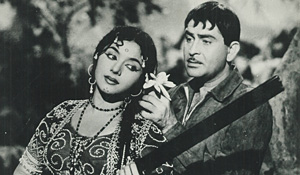 WHERE THE GANGES FLOWS
WHERE THE GANGES FLOWS
[Jis Desh Men Ganga Behti Hai]
New 35mm Print!
A controversial entry in the Kapoor canon, this film (nominally directed by Radhu Karmakar, the studio's cinematographer-in-residence) marked Kapoor's final direct incarnation of his tramp character and the first time he was not paired with Nargis. Raju — portrayed this time out as at best a naive innocent and at worst a total simpleton — is a pilgrim to the famous river, lured from his religious observances by a tomboyish (yet scantily clad) female bandit. Ardently pursuing her, he bumbles into an outlaw encampment, where he attempts to convert the brigands into latter-day Robin Hoods. Kapoor's performance is a constant question mark: is he indeed a fool, or is it a put-on, an act to win the lady through charm? While expressed in borderline simplistic terms, Raju's homilies reflect Gandhi's teachings on bringing non-violent change to the countryside; the film's story was apparently based on an apocryphal secular pilgrimage by an acolyte of Nehru's. In any event, the film is hilarious, and it is Kapoor's cleverest use of (often charmingly raunchy) double entendres.
DIR Radhu Karmakar; SCR Arjun Dev Rashk; PROD Raj Kapoor. India, 1960, b&w, 167 min. In Hindi with English subtitles. NOT RATED
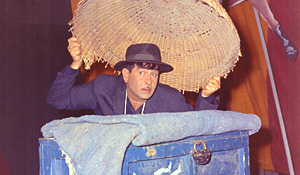 MY NAME IS JOKER [Mera Naam Joker]
New 35mm Print!
MY NAME IS JOKER [Mera Naam Joker]
New 35mm Print!
Kapoor's legendary film maudit, clocking in at almost four hours, was condemned as an exercise in self-pity throughout the Indian film world. A colossal failure, its reputation has been gradually revived by Western critics, who saw in it echoes of Chaplin's LIMELIGHT and proclaimed it a self-reflexive masterwork. Kapoor here completely undermines the tramp persona he had so carefully evolved over two decades, removing from it all traces of heroism and social justice: this tramp is a saccharine, mopey, love-obsessed clown whose one goal in life is to follow in his father's footsteps as a trapeze artist so he can "make Jesus laugh." JOKER mirrors the three-story, three-ages structure of Kapoor's first film AAG, tracing the clown's three pathetically failed relationships: with his high school teacher, with a Soviet circus performer and with a cross-dressing girl who dumps him when she becomes a movie star. As a sign of love, he sends each a sad clown doll and, later in life, gathers them all together at a circus performance for a kind of send-off monologue that begins and ends the film. A compulsively watchable, astonishing train wreck of a film.
DIR/PROD Raj Kapoor; SCR Khwaja Ahmad Abbas. India, 1970, color/b&w, 199 min including 15 min intermission. In English, Hindi and Russian with English subtitles. NOT RATED
 BOBBY
New 35mm Print!
BOBBY
New 35mm Print!
Following the commercial and critical disaster of MY NAME IS JOKER, Kapoor directed this charming paean to youth starring his son Rishi, which became an enormous hit among young urban audiences and exhibited a devil-may-care innocence that was a relief after the heavy social-message films that preceded it. The film concerns Raj (Rishi), the teenage son of a wealthy family, who falls in love with their former maid's granddaughter Bobby (played, in her first role, by Bollywood icon Dimple Kapadia). When Raj's parents try to arrange a marriage for him with a brain-damaged heiress, the young couple runs away, pursued by a horde of bounty-hunting bandits. What makes BOBBY so fun, other than the zany sets, outrageous clothes and delightfully corny physical comedy, is the music: Kapoor sought to marry traditional musical forms with Western music, and so an Ashkenazi wedding waltz is followed by a qawwali (a Sufi-inspired devotional song), a Goan folk song and the naughty, rock 'n' roll-flavored "Hum Tum Ek Kamre Mein" ("You and Me, Shut Up In a Room").
DIR/PROD Raj Kapoor; SCR Khwaja Ahmad Abbas, V. P. Sathe. India, 1973, color, 168 min. In Hindi with English subtitles. NOT RATED
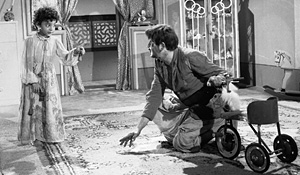 STAY AWAKE [Jagte Raho]
STAY AWAKE [Jagte Raho]
An ironic, socialist comedy-thriller, this is an episodic noir that exposes the behind-closed-doors perversions of Calcutta's upper-middle class. Kapoor plays a tramp who wanders into an upscale apartment building, where he witnesses a veritable carnival of evildoing as he moves from flat to flat; he is ultimately forced to wear a barrel (Hollywood hobo-style) to evade the police. The film was directed (or co-directed with Kapoor, as most insist) by Sombhu Mitra and Amit Mitra, two key progressive figures in the Calcutta theatre scene, and its storytelling rhythms — a more stately pace, an emphasis on close-ups, a more "natural" soundtrack and an emulation of literary models in terms of its structure and narration — bear a distinct similarity to the Bengali art film tradition familiar to Western viewers from the films of Satyajit Ray. This may help explain the film's success in the West, where its winning of the Grand Prix at the Karlovy Vary Film Festival made it the first Indian film to take the top award at a competition festival.
DIR/SCR Amit Mitra, Sombhu Mitra; SCR Khwaja Ahmad Abbas; PROD Raj Kapoor. India, 1956, b&w, 137 min. In Hindi and Bengali with English subtitles. Digital presentation. NOT RATED
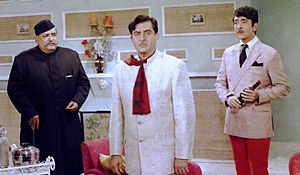 YESTERDAY, TODAY AND TOMORROW
YESTERDAY, TODAY AND TOMORROW
[Kal Aaj Aur Kal]
Three generations of Kapoors — Prithviraj, Raj and Raj's son Randhir, who also directs — take to the screen in this tale of generational conflict. Lonely, wealthy widower Raj brings his father (Prithviraj) from the old village and son (Randhir) from abroad so they can live together as a family. But the older and younger generations lock horns when the elderly patriarch attempts to marry his grandson off to a friend's granddaughter; the younger man, who has his own ideas about love and marriage, storms off with his girlfriend. Forlorn Raj takes to drink and debauchery and soon finds himself entangled in a nasty scandal, forcing the family to reunite to help him out of his troubles. The fun here is watching three terrific actors riff off one another — one senses that whatever script existed at the beginning of the shoot was quickly tossed out the window. The film also marks the last collaboration between the Kapoors and the music team of Shankar-Jaikishan, and the songs are delightful, ingeniously creative confections.
DIR Randhir Kapoor; SCR Virendra Sinha; PROD Raj Kapoor. India, 1971, color, 158 min. In Hindi with English subtitles. Digital presentation. NOT RATED
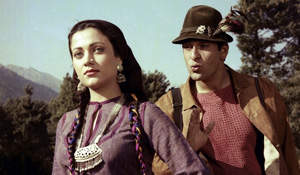 GOD, YOUR RIVER IS TAINTED
GOD, YOUR RIVER IS TAINTED
[Ram Teri Ganga Maili]
Kapoor's final and most financially successful film returns to the crusading social-message drama format of his early years, vividly depicting the corruption and mendacity at the heart of Indian society and utilizing the Ganges itself as a guiding metaphor for the country's decline. Narendra (Rajiv Kapoor, Raj's son), a young man fed up with the bloviating and corrupt politicians in his hometown of Calcutta, flees to the source of all purity, the headwaters of the great Ganges. Falling in love with a local girl not coincidentally named Ganga (Mandakini), he marries her (after a fashion) and then leaves again for the city, promising to return for her; family troubles prevent this, and he is unaware that a child is born from their union. Following the path of her fluvial namesake, Ganga travels to Calcutta to find her husband, a journey that becomes a Dante-esque descent into human degradation: Ganga ends up in a brothel, encounters her former husband again, and then things get even worse! The film's union of matters spiritual and environmental was at the time a major theme of Rajiv Gandhi, the nation's Prime Minister.
DIR Raj Kapoor; SCR V. P. Sathe, K. K. Singh, Jyoti Swaroop, based on a story by Raj Kapoor; PROD Randhir Kapoor. India, 1985, color, 166 min. In Hindi with English subtitles. Digital presentation. NOT RATED